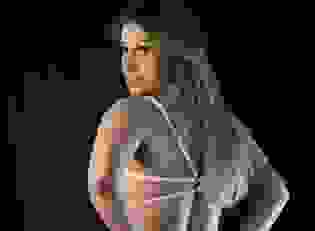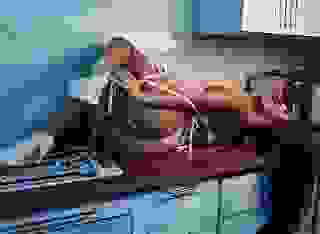Note: You can change font size, font face, and turn on dark mode by clicking the "A" icon tab in the Story Info Box.
You can temporarily switch back to a Classic Literotica® experience during our ongoing public Beta testing. Please consider leaving feedback on issues you experience or suggest improvements.
Click hereThe camp site was at the terminus of the bus route. We were the only passengers left. The driver and conductor helped us to unload our kit. We offered the 12 dinars to the conductor and a packet of ten Senior Service cigarettes each to her and the driver. They accepted the cigarettes as if we had given them an expensive birthday present. The conductress insisted on kissing all of us to say thank you.
The camp site was a surprise. It was modern, well equipped, and most of the other campers had large frame tents or caravans. Many were from West Germany. We pitched our small tents and had a meal in the dining room. Again we had a problem with payment. The food for 18 of us came to much less than a 500 dinar note. The waiter had to get the manager to open the safe to give us the change.
The next day we spent in Split. We changed some of our English pounds for dinars. The official rate of exchange at and official bureau de change was 600 dinars to a pound but tourist advice had told us to use anywhere else. We found we could get 2,100 dinars to a pound. UK currency regulations in 1962 didn't allow us to take more than twenty five pounds each. As far as possible we had paid for travel and accommodation in advance in London.
What we soon discovered was that the rate of exchange bore no relation to actual purchasing power. 2,000 dinars was the equivalent of a week's wages before taxation for a skilled motor mechanic. In today's terms think five to six hundred pounds.
We had been told that leather goods were cheap and good in Split. I had a pair of shoes hand made for me - within 24 hours. They were personally fitted to my feet. Since my feet were the largest the cobbler had ever seen he was apologetic. He charged me 1,000 dinars - ten shillings. Those shoes lasted me for ten years of hard use. One of my fellow scouts had a leather jacket made for him at a cost of 1,200 dinars.
When we booked our trip through the Yugoslav Embassy in London we were told very firmly that our visit to Korcula had to be with an Intourist guide. We couldn't go without that guide. We were surprised when the guide arrived at the Split campsite. Apparently she - a young lady in her early 20s - was the only Intourist employee who had ever been camping so she had been directed to accompany us. She would join us at the ferry.
In the meantime we visited Split's only supermarket to buy food and other supplies. There would be no shops on Korcula. None.
The supermarket was a disappointment. A UK corner shop would have had a better choice of items. One item that we really needed was paraffin for our primus stoves. We hadn't been allowed to take paraffin on the cross-channel ferry. We bought several containers of what we thought was paraffin. It wasn't. It was wood alcohol and our primus stoves wouldn't work with it. We had to improvise with half of a tin can filled with sand soaked in wood alcohol.
At the campsite we had been told that the second evening would be a highlight of Split's entertainment - a free film show in the old town. We decided this was something we couldn't miss. The films would be projected on a Roman wall, part of Emperor Diocletian's palace. The first films were government propaganda including a gory colour film about the dangers of not brushing your teeth. The highlights were 1920s silent cartoons - early Mickey Mouse and Keystone Cops. But we enjoyed ourselves mixing with the locals. I managed to get into conversation with a Young Lady Pioneer of about my age and missed some of the films. At the end of that evening's entertainment we swapped belts. She had a UK Scout belt. I had, and still have, her Young Pioneer's belt.
Back at the campsite the bar was to stay open late. After our evening meal some of us decided to try the impressive display of unfamiliar alcoholic spirits. They were labelled Whisky, Vodka, Tequila etc but all were produced in Yugoslavia. One of my friends was still annoyed with me after our canoe trip. His reputation was that he was the troop's hardest drinker and my pints of beer had threatened that reputation. He challenged me to match him, short by short, along the bar.
He was being slightly unfair. I had drunk two pints of local Pilsner with the meal to his water. But, encouraged by the others, I accepted. I thought all the drinks were remarkably similar with colouring to make them saleable as different types. We started with doubles of so-called whisky. The prices seemed ridiculous. A double cost 3 dinars.
He and I sat at tables near the bar while others fetched the drinks for us. From time to time one of us needed to go to the toilet. I was enjoying myself by the time I had drunk eight doubles and only had six different types to go. Those were lined up in front of me. When I had finished the whole lot I asked where he was. He had gone outside after the seventh double and had not returned. I walked back to my tent and slept well.
The ferry trip from Split to Korcula was slow on a pre First World War steamer. On arrival we were surprised to be met by an official reception party. We were apparently the first foreign tourists to visit Korcula since before the Second World War. We walked in procession to the only official government building in the town - the Mental Asylum. We all went into the large bar, the only place on Korcula that sold alcohol.
The Intourist lady translated some of the speeches of welcome and translated our leaders' replies. The Mayor stood forward and announced that he wasn't satisfied with the speeches in Serbo-Croat. I understood him. He was speaking in Serbo-Croat accented Australian strine. He had served with the Australian Army in North Africa and was proud of his 'English'. My leaders were nonplussed because his accent and slang were meaningless. I stepped forward, congratulated the Mayor on his English, matching his Strine, and expressed our pleasure in being greeted in our own language. The Mayor had demonstrated his skill to his fellow Korculans, and my intervention had confirmed that he was indeed speaking English.
There were several toasts to be drunk before we broke up into small groups. The Mayor took me aside, thanked me for confirming that he had been speaking English, but told me that our Intourist guide was a government spy, and currently the only communist on Korcula. We had to get rid of her somehow because she might see things the Korculans didn't want the government to know about.
I didn't understand what exactly he meant but I passed his message on to the Scout leaders. I don't know what happened. I suspect that she was not accustomed to backpack camping, but she was on the next morning's ferry back to Split. She told the Mayor that our group was obviously no threat to the stability of Yugoslavia and her presence was no longer necessary.
The Mayor rode his horse to our camp to congratulate us. He told me that we had been granted the freedom of Korcula for ridding the island of the government. Now she had gone, the majority of the inhabitants of the mental asylum could get back to their normal lives. They weren't insane, they were political exiles for dissent against the government. They lived and worked in the town, only staying at the asylum when a government inspector was on the way. The ferry captain would send a radio message shortly after leaving Split allowing time for the asylum residents to assemble.
I told the Mayor about our project to map the island because the English didn't know its shape and size. He laughed so loudly that our leaders asked me what I had said that was so funny. I asked the Mayor.
His answer was that during the Second World War English army officers had been embedded with the Yugoslav resistance on the local islands. The resistance, the English officers and Royal Navy had been playing hide and seek throughout the islands and all over Korcula while fighting the Germans based on a neighbouring island. The British military knew every inch of the island in minute detail. He produced British military maps that showed everything at a scale of 50 inches to the mile.
But we were committed to surveying Korcula even if we couldn't match the maps the Mayor had. The eighteen of us packed our tents and went around the island, triangulating and surveying. We stayed on various farms. The farmers wouldn't accept money but were pleased to have eighteen young men to do some work. We rebuilt stone walls, using the knowledge gained in Yorkshire, cleared ditches, removed scrub, repaired barns etc.
Each evening we would sit around drinking the farm-made wine and local spirits. The bar in the Mental Asylum was a sham, like the so-called patients. It was stocked with officially produced spirits from government factories and was only in use when a communist party official was present. They rest of the time the locals produced their own illegally-distilled potions. The staff at the Mental Asylum, paid for by the government, were only there if an official was on the island.
At the end of our stay we had been unable to spend any Yugoslav money but had been drunk every evening. We corrected our inadequate maps by reference to the Mayor's maps to produce something that looked good.
We had spent ten days on Korcula before we left by ferry to Split to catch another ship going North up the Adriatic. The Mayor and council were at the quayside to see us off and I had to translate and respond to the Mayor's speech in his 'English'.
On the ship we had far more Yugoslav dinars than we could feasibly spend before leaving the country. We played cards using the dinars almost as monopoly money. When we arrived at Rijeka we were to spend a night in a hotel. We paid to upgrade to the best rooms but that barely touched our collection of money. We were only allowed to take 1,500 dinars in cash out of the country and each of us had far more.
The manager of the hotel decided to give us a very pregnant waitress. We were embarrassed that she was working very hard to bring us food. After breakfast we decided to give her our surplus cash as a tip. We suspected that had been the manager's intention but he and she were startled at the amount we gave. We gave her 150,000 dinars. That had cost us about seventy-five pounds sterling but if we had time to go to change point and tried to change it back we would have got about twenty pounds.
To her that was like winning a lottery. The purchase power in Yugoslavia was about three million pounds. It paid for her wedding scheduled for the next week, the flat she and her new husband occupied, the furniture, and equipped the new baby plus enough to mean she didn't have to work for many years. She kept corresponding with us for over a decade.
We caught a train to take us back to Calais. At the Yugoslav border we were checked to make sure we didn't have more than 1,500 dinars each. Our surplus - about 10,000 dinars - we put in a box at the station for the Yugoslav Red Cross.
The journey back to the UK was uneventful. Eventually we wrote up our account of our trip to Yugoslavia for a Scout log competition - which we won with a highly edited and fictionalised account.
That trip to Yugoslavia was my last activity as a scout.
+++
- COMMENTS








